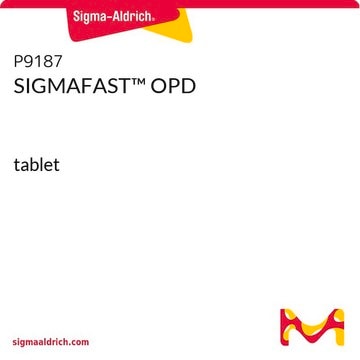P9029
o-Phenylenediamine
peroxidase substrate, chromogenic, ≥98.0%, powder
Synonym(s):
1,2-Diaminobenzene, 1,2-Phenylenediamine, OPD
About This Item
Recommended Products
product name
o-Phenylenediamine, Peroxidase substrate, ≥98.0%, powder
vapor density
3.7 (vs air)
vapor pressure
0.01 mmHg ( 25 °C)
Assay
≥98.0%
form
powder
color
white to off-white
bp
256-258 °C
mp
98-102 °C
solubility
ethanol: 50 mg/mL, clear, colorless to faintly yellow
fluorescence
λex 337 nm; λem 417 nm (Pyruvic acid derivative)
storage temp.
2-8°C
SMILES string
Nc1ccccc1N
InChI
1S/C6H8N2/c7-5-3-1-2-4-6(5)8/h1-4H,7-8H2
InChI key
GEYOCULIXLDCMW-UHFFFAOYSA-N
Looking for similar products? Visit Product Comparison Guide
General description
Application
Caution
Signal Word
Danger
Hazard Statements
Precautionary Statements
Hazard Classifications
Acute Tox. 3 Oral - Acute Tox. 4 Dermal - Acute Tox. 4 Inhalation - Aquatic Acute 1 - Aquatic Chronic 1 - Carc. 2 - Eye Irrit. 2 - Muta. 2 - Skin Sens. 1
Storage Class Code
6.1C - Combustible acute toxic Cat.3 / toxic compounds or compounds which causing chronic effects
WGK
WGK 3
Flash Point(F)
276.8 °F - closed cup
Flash Point(C)
136 °C - closed cup
Certificates of Analysis (COA)
Search for Certificates of Analysis (COA) by entering the products Lot/Batch Number. Lot and Batch Numbers can be found on a product’s label following the words ‘Lot’ or ‘Batch’.
Already Own This Product?
Find documentation for the products that you have recently purchased in the Document Library.
Customers Also Viewed
Articles
NBT-BCIP substrate system aids in western blotting and immunohistological staining, producing a blue-purple insoluble end product.
Our team of scientists has experience in all areas of research including Life Science, Material Science, Chemical Synthesis, Chromatography, Analytical and many others.
Contact Technical Service








